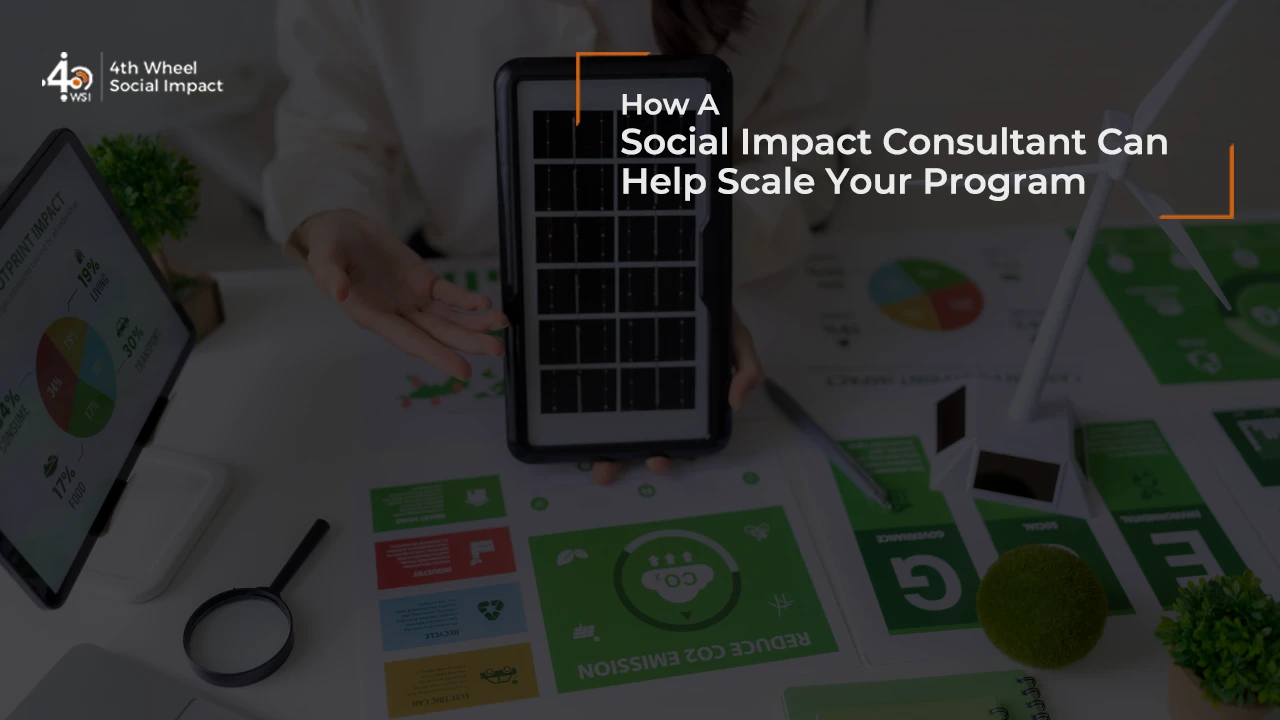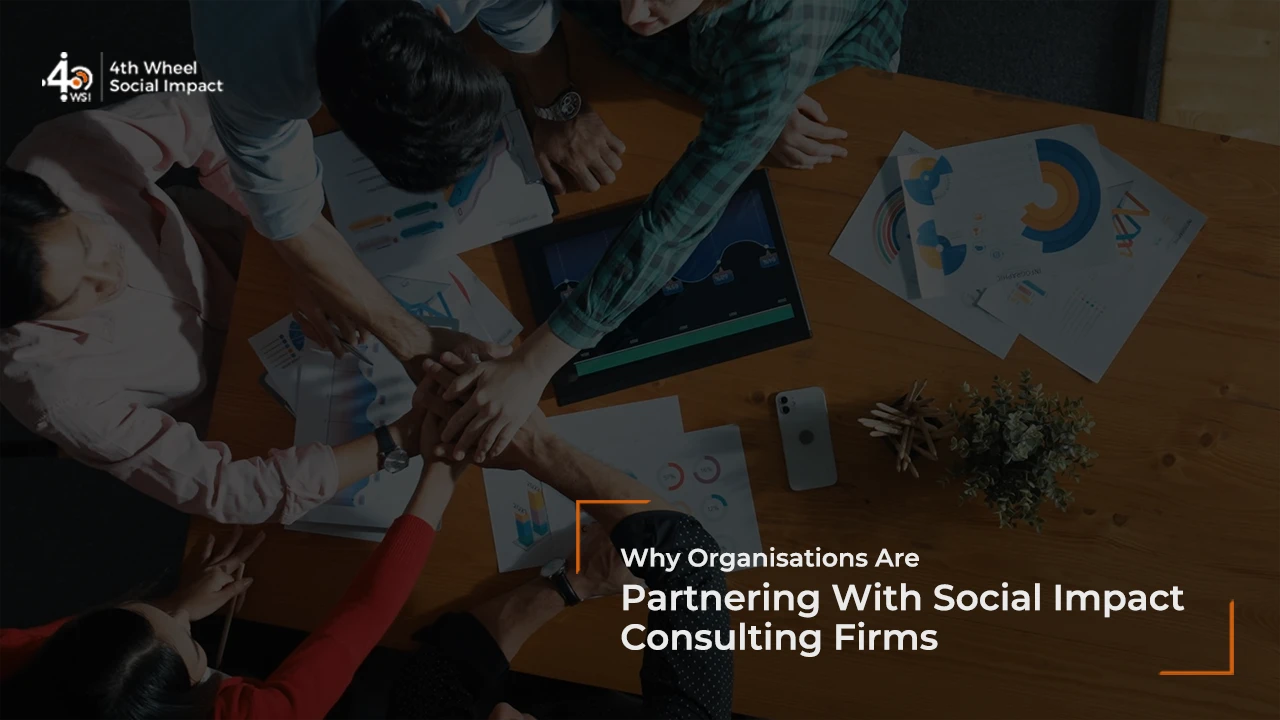A recent report by Sambodhi and Dasra found that CSR compliance reporting often consumes more funds than the impact programs themselves. This shows that CSR programs need effective assessments that do not take up a large part of their budgets. Social impact organizations or CSR programs should hire social impact consulting firms that are experienced and have developed affordable, effective evaluation methodologies.
A social impact consulting firm typically undertakes several key tasks related to implementation, strategic advisory, and assessments. These firms help impact organizations to develop specific theories of change and evaluation frameworks. They also conduct stakeholder engagement processes, facilitate partnerships between nonprofits, and government entities.
Selecting a social impact consulting partner with the capacity and knowledge to support your vision is vital. Before making this decision, every CSR organization and program head should ask a few key questions.
Here are the five key questions every organisation should ask to before hiring a social impact consulting firm
1. Do They Understand Your Mission, Sector, and Stakeholders?
Social impact firms specialize in different sectors and strategic areas. One of the first questions to ask a consulting firm is whether they understand the sector you want to target.
For instance, if your program’s mission is to focus specifically on education for girls in backward districts in rural India, then a social impact firm with experience in co-ed education programs might not be able to help with the specific areas required to understand the skewed realities for many girls in marginalized communities.
Or a social impact consulting partner largely working in urban or tier 1 cities may not be able to understand the specific context of marginalised rural areas.
Ask whether the social impact assessment consultants have experience working with stakeholders similar to yours. If you are funded by an international funder instead of Indian donors, compliance reporting or communication must be customised to their expectations. Or if your program needs support to work with local Panchayat functionaries, a consulting firm experienced solely in working with top-level management will not be suitable.
Look for impact consultants who understand key stakeholders, the regulatory environment, and common challenges your programs may face. Their expertise should go beyond surface-level familiarity.
2. What Is Their Approach to Social Impact Measurement?
The majority of impact consulting firms will tell you that they can effectively measure impact programs. Yet, don’t settle for a simple ‘Yes’ and ask deeper questions.
Sit down with the impact consultants from the firm to understand if they know about the specific impact evaluation study frameworks needed to measure your programs. Understand how they implement these frameworks and the kind of indicators they refer to in order to measure programs.
Evaluate if the frameworks the social impact assessment consultants use are the best fit for your organization. Get to know if they have data collection bandwidth and know-how to create evidence-based insights.
Social impact consulting is an incredibly complex task. It requires an understanding of the specific context of the programs, the stakeholders involved in the program, as well as the ones who will be looking at impact numbers. Evaluate whether the social impact consulting firm you are considering understands what long-term impact and short-term outputs look like for your program.
Also read: How to Measure Social Impact in 2025: A Step-by-Step Guide
3. Will They Build Internal Capacity or Just Deliver Reports?
This is one of the most overlooked aspects of assessing a social impact consulting firm. Many impact consulting firms only cater to deliverables and concentrate on implementing or delivering reports, whereas others also undertake capacity development of your internal teams. Whether it is developing the capacity of your team to engage in social media for your programs or equipping the field teams with the necessary technical knowledge required for implementation, social impact assessment consultants can be involved in knowledge transfer.
Ask yourself first if you require the social impact consulting partner to build your internal team’s capacity. If the answer is yes, then go ahead with understanding how this capacity building will be undertaken and what results you can expect from it.
Inquire about their approach to training and mentoring. Will they provide formal training sessions for your staff? Do they create documentation that enables you to replicate their methodologies? How do they ensure that the systems and processes they develop can be sustained after their engagement ends? Look for impact consultants who are explicitly committed to building your organization’s long-term capabilities.
4. What Tools, Methods, and Ethical Principles Do They Use?
The social impact consulting sector has seen an explosion of new tools and technologies in recent years, from sophisticated data visualization platforms to AI-powered analytics systems. Yet, tools are only as good as the evaluation methodologies that guide their use.
Another important aspect that every impact program needs to consider is the ethical principles that it needs to follow. The program and program implementors must not discriminate or propagate any harmful notions and practices.
Make sure that the social impact consulting firm you are hiring follows strict ethical policies. Communicate to them that your ethical considerations are non-negotiable. Impact consulting involves working with vulnerable populations and sensitive data. As a result, it’s important that all the stakeholders are on board with the ethical principles.
5. Can They Demonstrate Results and Relationships That Last?
You should hire a social impact consulting firm that has the capacity to build sustainability in their work. Ask for evidence about how their work has resulted in long-term and sustainable impact. How has it strengthened teams and field executives to replicate and continue programs?
You can also ask for their past clients and, in some cases, referrals of their work. Look for case studies that follow up with clients months or years after the engagement to assess long-term outcomes.
Ask about their approach to relationship management and communication. How do they make sure that their clients remain engaged and informed throughout the impact consulting process? How do they handle challenges or setbacks? What happens when their recommendations don’t produce the expected results? Look for impact consultants who demonstrate transparency, accountability, and a commitment to working through challenges together.
Interesting read: Benefits of Dedicated Monitoring, Evaluation & Learning(MEL)Team
Conclusion
Open and honest communication about brand values and culture is necessary. Selecting the right social impact consulting firm is a decision that can shape your organization’s trajectory for years to come. The five questions outlined above provide a framework for evaluating potential partners comprehensively.
The right social impact consulting partner will not only help you work through immediate challenges but will also strengthen your organization’s capacity to create lasting change. They will bring deep sector expertise, sophisticated methodologies, and a commitment to ethical practice. Most importantly, they will share your commitment to creating a better world and will approach your partnership with the seriousness and dedication that this mission demands.
Take the time to ask these questions thoroughly, check references carefully, and trust your instincts about cultural fit. The 4th Wheel is one of the most sought-after social impact consulting firms in the social impact consulting space. Contact us today to develop capacity for impact measurement in your organization.




